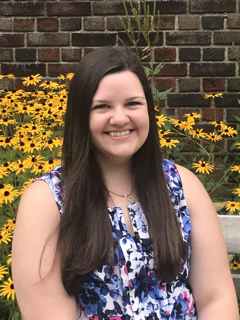 Why I chose Pitt: Pitt may be one of the oldest genetic counseling programs, but it was important to me that program leadership take pride in using student and alumni feedback to keep the program and curriculum up-to-date as the field evolves and changes. Being housed within the Graduate School of Public Health is also a great advantage for the program, allowing students to develop some additional skill sets, perspectives, and knowledge to use in our future careers. Probably the biggest draw of the Pitt program is the people – from faculty and staff to fellow students, everyone is so welcoming and supportive, and truly invested in your interests and success. On top of all of that, Pittsburgh itself is a great city! After visiting Pittsburgh during my interview, I definitely felt that it had great potential to be my home away from home.
Why I chose Pitt: Pitt may be one of the oldest genetic counseling programs, but it was important to me that program leadership take pride in using student and alumni feedback to keep the program and curriculum up-to-date as the field evolves and changes. Being housed within the Graduate School of Public Health is also a great advantage for the program, allowing students to develop some additional skill sets, perspectives, and knowledge to use in our future careers. Probably the biggest draw of the Pitt program is the people – from faculty and staff to fellow students, everyone is so welcoming and supportive, and truly invested in your interests and success. On top of all of that, Pittsburgh itself is a great city! After visiting Pittsburgh during my interview, I definitely felt that it had great potential to be my home away from home.
Background: Genomic medicine assistant (Geisinger); “Buddy” volunteer (BuddyUP Tennis); “Big Buddy” volunteer (Camp Courage Bereavement Camp)
Work Position: NYMAC genetic counseling graduate student worker
Alyson Evans (BS biology, minors in psychology and women’s studies, King’s College, 2015)
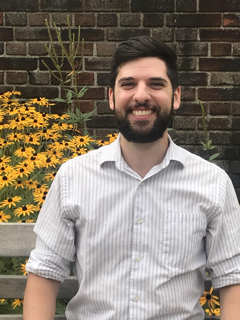 Why I chose Pitt: I originally came to Pittsburgh to complete my undergraduate studies, and now it’s been my home for almost seven years. Aside from the city’s vibrant culture, fantastic food, and myriad of events and locations to explore, it offers the opportunity of a deep and rewarding graduate education in Pitt Public Health. I knew from the start of the application process that Pitt’s genetic counseling program was my top choice. Its location places it in the middle of a bustling academic and medical center, with access to a host of diverse clinical sites and resources. The sheer volume of cases that students experience in these clinics provides hefty exposure to the field’s broad patient base and the challenges that accompany them. Along the way, current faculty and students offer a supreme amount of support and guidance, making the journey a lot less daunting. By the end of the program, I’m confident that my classmates and I will be fully prepared to succeed in the exciting field of genetics and beyond.
Why I chose Pitt: I originally came to Pittsburgh to complete my undergraduate studies, and now it’s been my home for almost seven years. Aside from the city’s vibrant culture, fantastic food, and myriad of events and locations to explore, it offers the opportunity of a deep and rewarding graduate education in Pitt Public Health. I knew from the start of the application process that Pitt’s genetic counseling program was my top choice. Its location places it in the middle of a bustling academic and medical center, with access to a host of diverse clinical sites and resources. The sheer volume of cases that students experience in these clinics provides hefty exposure to the field’s broad patient base and the challenges that accompany them. Along the way, current faculty and students offer a supreme amount of support and guidance, making the journey a lot less daunting. By the end of the program, I’m confident that my classmates and I will be fully prepared to succeed in the exciting field of genetics and beyond.
Background: Research assistant in the dental registry and DNA repository (University of Pittsburgh); Crisis Text-line volunteer (online); drumline section leader (University of Pittsburgh). Undergraduate teaching assistant for Intro to Biology II class (University of Pittsburgh).
Work Position: Genetic counseling assistant at UPMC Magee-Women’s Hospital
Andrew Fazenbaker (BS biological sciences, minors in chemistry and religious studies, University of Pittsburgh, 2016)
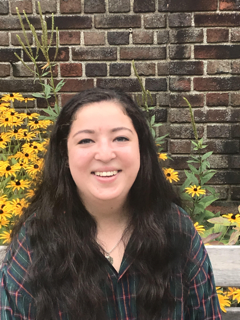 Why I chose Pitt: Being from Pittsburgh myself, I have quite the obsession with the city. With its hometown feel and endless activities you will never be bored, but most importantly Pittsburgh has an inspiring medical community. Pitt’s program takes full advantage of these resources and being located in the Graduate School of Public Health we as students are being fully prepared to enter this diverse field. If that was not enough, the strong sense of community and leadership within and outside the program is unbeatable. From the confidence building model of the curriculum to the time and investment spent by each and every mentor, Pitt is truly an all-encompassing program. I am excited to be spending my graduate career here and cannot wait for the next two years.
Why I chose Pitt: Being from Pittsburgh myself, I have quite the obsession with the city. With its hometown feel and endless activities you will never be bored, but most importantly Pittsburgh has an inspiring medical community. Pitt’s program takes full advantage of these resources and being located in the Graduate School of Public Health we as students are being fully prepared to enter this diverse field. If that was not enough, the strong sense of community and leadership within and outside the program is unbeatable. From the confidence building model of the curriculum to the time and investment spent by each and every mentor, Pitt is truly an all-encompassing program. I am excited to be spending my graduate career here and cannot wait for the next two years.
Background: Sexual assault advocate (Vera House, Syracuse NY), biological sciences intern (Carnegie Science Center, Pittsburgh PA), genetic counseling shadowing (Magee-Womens Hospital, Pittsburgh PA)
Work Position: Genetic counselor assistant UPMC Children’s Hospital of Pittsburgh
Ashley Lahr (BS biology, BA psychology, Syracuse University, 2017)
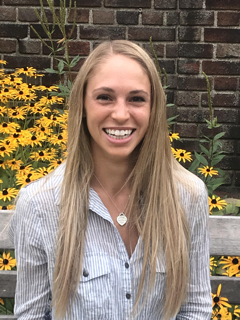 Why I chose Pitt: I chose Pitt because of the program structure, people, and legacy. I was excited about taking the majority of the courses the first year to provide us with the overall comprehension and necessary knowledge during our clinical rotations our second year. During the interviews, it was clear how dedicated the co-directors and staff truly were towards the current students’ education and training. Finally, with Pitt being the second oldest program, their reputation inspired trust and admiration. I knew a program with so much history and experience would have the tools to shape their students into successful, well rounded genetic counselors.
Why I chose Pitt: I chose Pitt because of the program structure, people, and legacy. I was excited about taking the majority of the courses the first year to provide us with the overall comprehension and necessary knowledge during our clinical rotations our second year. During the interviews, it was clear how dedicated the co-directors and staff truly were towards the current students’ education and training. Finally, with Pitt being the second oldest program, their reputation inspired trust and admiration. I knew a program with so much history and experience would have the tools to shape their students into successful, well rounded genetic counselors.
Background: Genetic counseling intern at Froedtert and the Medical College of Wisconsin; GC shadowing at the University of Missouri Hospital; crisis hotline counselor (Missouri Crisis Line); therapeutic riding assistant (Cedar Creek Therapeutic Riding Center); Children’s Behavioral Health Welfare Agency volunteer (Great Circle)
Work Position: Clinical research assistant at TRiNDS (Therapeutic Research in Neuromuscular Disorders Solutions)
Caroline Bong (BS in biological sciences, minors in psychology and Spanish, multicultural certificate, University of Missouri, 2018)
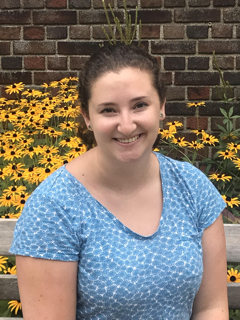 Why I chose Pitt: I chose Pitt for many reasons, but my decision to attend the University of Pittsburgh was made easy once I visited campus. I was blown away by the experience of the leadership, which made me realize that this program prepares students not only to be confident and well-rounded genetic counselors, but also to be leaders in the field for the rest of their careers. Being situated in the Graduate School of Public Health and the unique primary care rotation provide students with the tools to adapt to genetic counselors’ ever-changing roles in health care. I wanted the resources and opportunities of a large urban university, but the support and ability to build strong relationships more characteristic of a smaller community, which perfectly blend together at Pitt. On top of all the benefits of the program itself, Pittsburgh has an expansive medical community, and is an affordable, fun, and diverse city. The view coming out of the Fort Pitt tunnel at night doesn’t hurt either.
Why I chose Pitt: I chose Pitt for many reasons, but my decision to attend the University of Pittsburgh was made easy once I visited campus. I was blown away by the experience of the leadership, which made me realize that this program prepares students not only to be confident and well-rounded genetic counselors, but also to be leaders in the field for the rest of their careers. Being situated in the Graduate School of Public Health and the unique primary care rotation provide students with the tools to adapt to genetic counselors’ ever-changing roles in health care. I wanted the resources and opportunities of a large urban university, but the support and ability to build strong relationships more characteristic of a smaller community, which perfectly blend together at Pitt. On top of all the benefits of the program itself, Pittsburgh has an expansive medical community, and is an affordable, fun, and diverse city. The view coming out of the Fort Pitt tunnel at night doesn’t hurt either.
Background: Clinical research coordinator in the Center for Cancer Genetics and Prevention (Dana-Farber Cancer Institute); active listener on 7 Cups of Tea (online); general biology and neurobiology laboratory teaching assistant (Providence College).
Work Position: Genetic counseling assistant at UPMC Shadyside GI Lab
Christine Drogan (BS biology, certificate in neuroscience, Providence College, 2016)
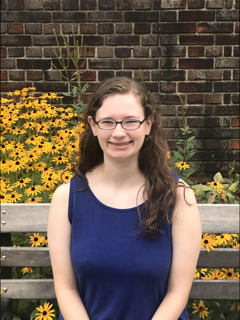 Why I chose Pitt: I chose Pitt for several reasons: Public health is becoming more relevant as the field of genetic counseling expands, and the opportunity to take public health courses and do a dual degree or public health certificate really appealed to me. I love that coursework is done in the first year to give us a solid foundation before beginning clinical rotations over the summer. Students have access to two health care systems via public transportation, allowing easy access to diversity for clinical rotations. Leaders of the program are constantly thinking about how the program can be improved, a necessity in a constantly-changing field. The opportunity to live in Pittsburgh sealed the deal; it has all the benefits of a big city with a relatively low cost of living and good public transportation.
Why I chose Pitt: I chose Pitt for several reasons: Public health is becoming more relevant as the field of genetic counseling expands, and the opportunity to take public health courses and do a dual degree or public health certificate really appealed to me. I love that coursework is done in the first year to give us a solid foundation before beginning clinical rotations over the summer. Students have access to two health care systems via public transportation, allowing easy access to diversity for clinical rotations. Leaders of the program are constantly thinking about how the program can be improved, a necessity in a constantly-changing field. The opportunity to live in Pittsburgh sealed the deal; it has all the benefits of a big city with a relatively low cost of living and good public transportation.
Background: AmeriCorps member and volunteer coordinator (Impact America, Alabama); genetic counseling assistant (University of Alabama at Birmingham); Birmingham Crisis Center hotline volunteer; genetic counseling internship (Northwestern University); GC shadow (Advocate Children’s Hospital, Chicago)
Work Position: Genetic counseling program teaching assistant
Claire McDonald (BA in biology, Carleton College, 2015)
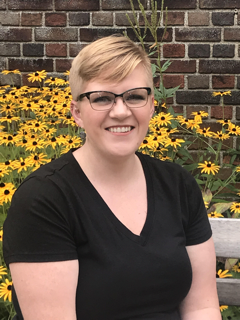 Why I chose Pitt: Pitt’s rich history in both medicine and public health drew me here, but it was the commitment and passion for moving forward that the faculty and students exhibited that ultimately made my decision. I appreciate the model the program implements to build students’ confidence and skills, followed by an immersive clinical experience that really imitates the lifestyle of a working professional. Pitt Public Health gives students a well-rounded experience, and prepares students to take on more complex roles as the future of genetics changes.
Why I chose Pitt: Pitt’s rich history in both medicine and public health drew me here, but it was the commitment and passion for moving forward that the faculty and students exhibited that ultimately made my decision. I appreciate the model the program implements to build students’ confidence and skills, followed by an immersive clinical experience that really imitates the lifestyle of a working professional. Pitt Public Health gives students a well-rounded experience, and prepares students to take on more complex roles as the future of genetics changes.
Background: Student research assistant in metabolomics (Iowa State University); community support professional (Optimae Life Services); principles of genetics lab teaching assistant (Iowa State University); recruitment and morale captain for the community and alumni outreach committees (Iowa State Dance Marathon, Children’s Miracle Network); genetics and psychology tutor (Iowa State University); domestic volence hotline advocate (ACCESS); executive vice president (Sigma Kappa Sorority).
Work Position: Research assistant at the Center for Craniofacial and Dental Genetics
Lauren Winter (MS biomedical sciences, Iowa State University, 2017; BS majors in genetics and psychology, Iowa State University, 2016)
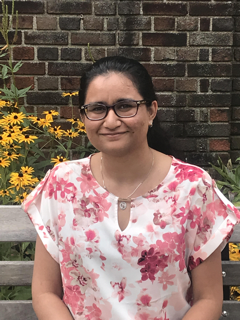 Why I chose Pitt: I was initially interested in Pitt’s program because it was one of the most well-established and one of the few that offered a focus on public health. Coming to Pittsburgh for my interview, I quickly realized that the program had even more to offer than its history and multidisciplinary perspective. There is a strong spirit of community running throughout the program, from the co-directors to the professors to the alumni. I felt assured that I could be in an environment in which I could succeed and in turn help others do so as well. In addition to all that, there is a wealth of learning opportunities within the school and city. I am excited to be in Pittsburgh and look forward to my next two years here!
Why I chose Pitt: I was initially interested in Pitt’s program because it was one of the most well-established and one of the few that offered a focus on public health. Coming to Pittsburgh for my interview, I quickly realized that the program had even more to offer than its history and multidisciplinary perspective. There is a strong spirit of community running throughout the program, from the co-directors to the professors to the alumni. I felt assured that I could be in an environment in which I could succeed and in turn help others do so as well. In addition to all that, there is a wealth of learning opportunities within the school and city. I am excited to be in Pittsburgh and look forward to my next two years here!
Background: Crisis text line counselor, volunteer at Greater Los Angeles Veterans Affairs Genetics Clinic, Venice Family Clinic health care navigator and clinic assistant
Work Position: TBD
Pooja Solanki (BS biology, minor in global health, UCLA, 2017)
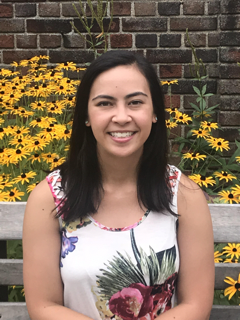 Why I chose Pitt: I chose Pitt because, as part of the Graduate School of Public Health, its genetic counseling program provides a unique perspective. As genetic counselors it’s important for us to be sensitive to the human aspect of genetics and to consider how societal influences affect our healthcare. I also think the option to hold a work-study position is extremely helpful in cultivating important mentorship and networking opportunities in addition to clinical rotations. The support I have already received from the program leadership has made me feel incredibly welcome. I’m excited to be a part of the Pitt GC program and am looking forward to exploring the city of Pittsburgh!
Why I chose Pitt: I chose Pitt because, as part of the Graduate School of Public Health, its genetic counseling program provides a unique perspective. As genetic counselors it’s important for us to be sensitive to the human aspect of genetics and to consider how societal influences affect our healthcare. I also think the option to hold a work-study position is extremely helpful in cultivating important mentorship and networking opportunities in addition to clinical rotations. The support I have already received from the program leadership has made me feel incredibly welcome. I’m excited to be a part of the Pitt GC program and am looking forward to exploring the city of Pittsburgh!
Background: Manager of translational soft tissue sarcoma laboratory and student mentor (Mount Sinai Hospital, Toronto), peer support volunteer (The Women’s Centre of Halton, Oakville), genetic counseling shadowing (Mount Sinai Hospital, Toronto), biology teaching assistant (McMaster University, Hamilton).
Work Position: Research assistant at UPMC Children’s Hospital of Pittsburgh
Rosemarie Venier (BSc honours molecular biology, McMaster University, Canada, 2010; MSc biology, McMaster University, Canada, 2012)
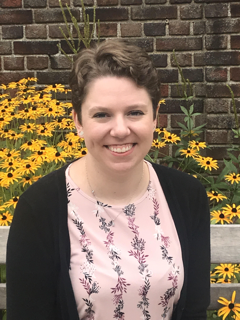 Why I chose Pitt: I applied to Pitt because of the program’s long standing reputation and its unique opportunities in public health. I also liked the way the program was structured, with most classes in year one and mainly clinical rotations in year two. Also, I liked that Pitt offers such a variety in clinical opportunities, including a new primary care rotation. When I came for my interview, Pitt was the school I could picture myself at. I loved the supportive environment between the students and the leadership. Everyone involved in the program was truly invested in the success of the students. I am confident I will graduate with the skills I need to be a successful genetic counselor and the ability to help solve evolving public health issues in genetics.
Why I chose Pitt: I applied to Pitt because of the program’s long standing reputation and its unique opportunities in public health. I also liked the way the program was structured, with most classes in year one and mainly clinical rotations in year two. Also, I liked that Pitt offers such a variety in clinical opportunities, including a new primary care rotation. When I came for my interview, Pitt was the school I could picture myself at. I loved the supportive environment between the students and the leadership. Everyone involved in the program was truly invested in the success of the students. I am confident I will graduate with the skills I need to be a successful genetic counselor and the ability to help solve evolving public health issues in genetics.
Background: Clinical research coordinator in infectious diseases (Cincinnati Children’s Hospital Medical Center), undergraduate research assistant at the Stress and Health in Pregnancy Research Program (Ohio State University), sexual assault hospital advocate (Women Helping Women, Cincinnati)
Work Position: Genetic counseling student worker at the Children’s Hospital of Pittsburgh Sickle Cell Program
Sarah McGee (BS molecular genetics, minor in clinical psychology, Ohio State University, 2017)
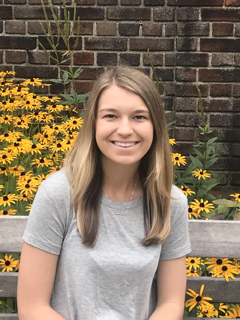 Why I chose Pitt: Growing up in Pittsburgh, I had the opportunity to be immersed in the city’s rich health and medical culture from a young age. When I began looking into genetic counseling programs, I was immediately drawn to Pitt. With a background in public health and aspirations to apply my training to different populations, the program’s position in the Graduate School of Public Health and the opportunity for the dual degree was very important to me. The passion and sense of unity among the program’s leaders and students also ensure a strong environment for learning. I’m excited to be back home and a part of this amazing program!
Why I chose Pitt: Growing up in Pittsburgh, I had the opportunity to be immersed in the city’s rich health and medical culture from a young age. When I began looking into genetic counseling programs, I was immediately drawn to Pitt. With a background in public health and aspirations to apply my training to different populations, the program’s position in the Graduate School of Public Health and the opportunity for the dual degree was very important to me. The passion and sense of unity among the program’s leaders and students also ensure a strong environment for learning. I’m excited to be back home and a part of this amazing program!
Background: Development associate and crisisline worker at Mental Health America of Greenville County, genetic counseling shadowing at Greenwood Genetic Center, medical clinical rotations at Greenville Health System, STEM mentor at Furman University
Work Position: TBD
Stephanie Betts (BS health sciences, minor in Latin American Studies, Furman University, 2017)
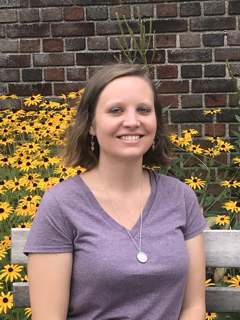 Why I chose Pitt: I fell in love with the city when I visited in 2015, so when I started applying to GC programs I decided to apply to Pitt. The more I learned about the dual degree program, the more I knew I wanted to be at Pitt. I want to work with underserved populations to improve access to genomic medicine, so pairing the MPH public health genetics program with the genetic counseling program seemed like a tailored fit! The other big draw has to be the people. The faculty are incredibly supportive. They want their students to do well. It may sound cliché, but I feel like Pitt has an atmosphere where faculty aren’t teaching students, they’re training colleagues.
Why I chose Pitt: I fell in love with the city when I visited in 2015, so when I started applying to GC programs I decided to apply to Pitt. The more I learned about the dual degree program, the more I knew I wanted to be at Pitt. I want to work with underserved populations to improve access to genomic medicine, so pairing the MPH public health genetics program with the genetic counseling program seemed like a tailored fit! The other big draw has to be the people. The faculty are incredibly supportive. They want their students to do well. It may sound cliché, but I feel like Pitt has an atmosphere where faculty aren’t teaching students, they’re training colleagues.
Background: Services coordinator (Linn County Developmental Disabilities Program), direct support professional, “Buddy” with Night to Shine
Work Position: Precision medicine program assistant (All of Us Research Program; Pitt+Me Discovery)
Vickie Bacon (BS biology, California State University, Long Beach, 2012)